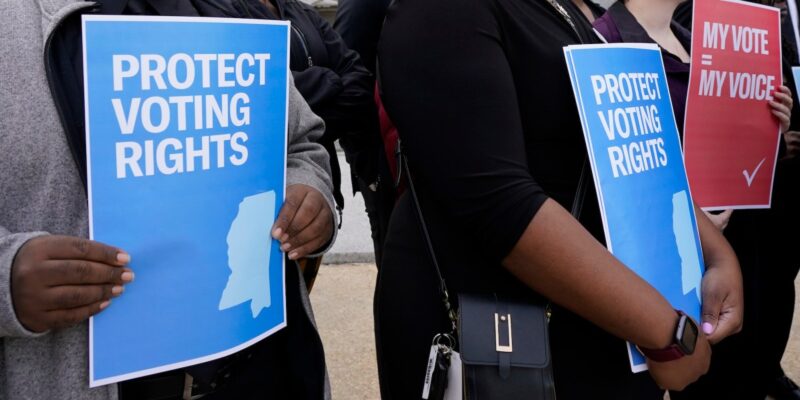
The most conservative appellate court in the country on Thursday reinstated a Jim Crow-era felon disenfranchisement law in Mississippi that could prevent tens of thousands of people, who are disproportionately Black, from voting in November.
The full 5th Circuit Court of Appeals, which covers Mississippi, Louisiana, and Texas and has become infamous for its fiercely right-wing opinions, upheld a state law dating back to 1890 that permanently prevents Mississippians from voting if they have been convicted of a list of 22 criminal categories, encompassing about 100 specific crimes that include timber larceny, bigamy, and writing a bad check. The opinion overturns the ruling of a three-judge panel on the 5th Circuit from August 2023 which invalidated Mississippi’s law, saying that it violated the 8th Amendment’s prohibition on cruel and unusual punishment.
Writing for the 13-member majority, Judge Edith Jones, an appointee of Ronald Reagan, said that the earlier court decision “would thwart the ability of the State’s legislature and citizens to determine their voting qualifications, and would require federal courts overtly to make legislative choices that, in our federal system, belong at the State level.” (All but one of the judges that signed on to the opinion were appointed by Republican presidents.)
Six judges, all appointed by Democratic presidents, dissented. “Denying released offenders the right to vote takes away their full dignity as citizens, separates them from the rest of their community, and reduces them to ‘other’ status,” wrote Judge James L. Dennis, who was appointed by Bill Clinton.
The Mississippi law the court upheld is the harshest felon disenfranchisement law in the country. It prevents nearly 240,000 people from voting—more than 10 percent of the state’s voting-age population, including 16 percent of Black residents. From 1994 to 2017, the law disenfranchised close to 50,000 people, according to an expert study submitted by groups challenging the law; 59 percent of them were Black, even though Blacks people make up only 38 percent of the state’s population. Fewer than 200 people had their rights restored by the state during that time.
The law was adopted in 1890 as part of a new state constitution that was specifically designed to uphold white supremacy. “Let us tell the truth if it bursts the bottom of the Universe,” Mississippi Supreme Court Justice Solomon S. Calhoon said at the constitutional convention in Jackson. “We came here to exclude the Negro. Nothing short of this will answer.”
In addition to adopting a literacy test and poll tax, the ex-Confederates who drafted the Jim Crow-era constitution included a provision disqualifying prospective voters who committed minor crimes like “obtaining goods under false pretenses”—offenses for which Black people were disproportionately charged.
That racist legacy remains alive in Mississippi today. “This ruling only perpetuates a policy rooted in the oppressive Jim Crow laws of the past, which stands in stark contrast to the principles of our supposedly inclusive democracy,” Nicole D. Porter, senior director of advocacy at The Sentencing Project, said after Thursday’s decision.
Mississippi is not alone in trying to prevent people with criminal convictions from voting. On Wednesday, Nebraska’s Republican attorney general blocked a measure allowing people with felony convictions to register to vote after serving their sentences, two days before it was set to become law. And Alabama is set to implement a new law a month before the November election that adds over 120 felonies to the state’s list of “crimes of moral turpitude” (another remnant of a Jim Crow-era state constitution) that bar people from voting.
Of course, there’s a certain irony to the GOP’s embrace of felon disenfranchisement laws nowadays. Republicans are eager to target constituencies that tend to vote against them, such as would-be Black voters in Mississippi, but they take a different attitude when it’s one of their own. The party is now led by a presidential candidate who was convicted of 34 felonies, and a parade of indicted fake electors flocked to the Republican National Convention in Milwaukee this week to nominate him, where delegates proudly wore “I’m Voting for the Felon” T-shirts.















